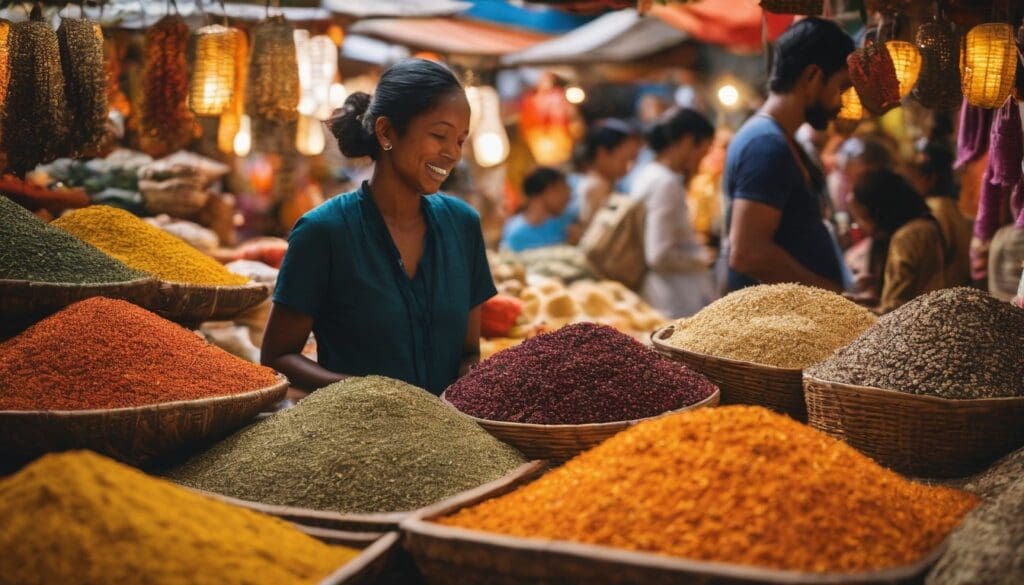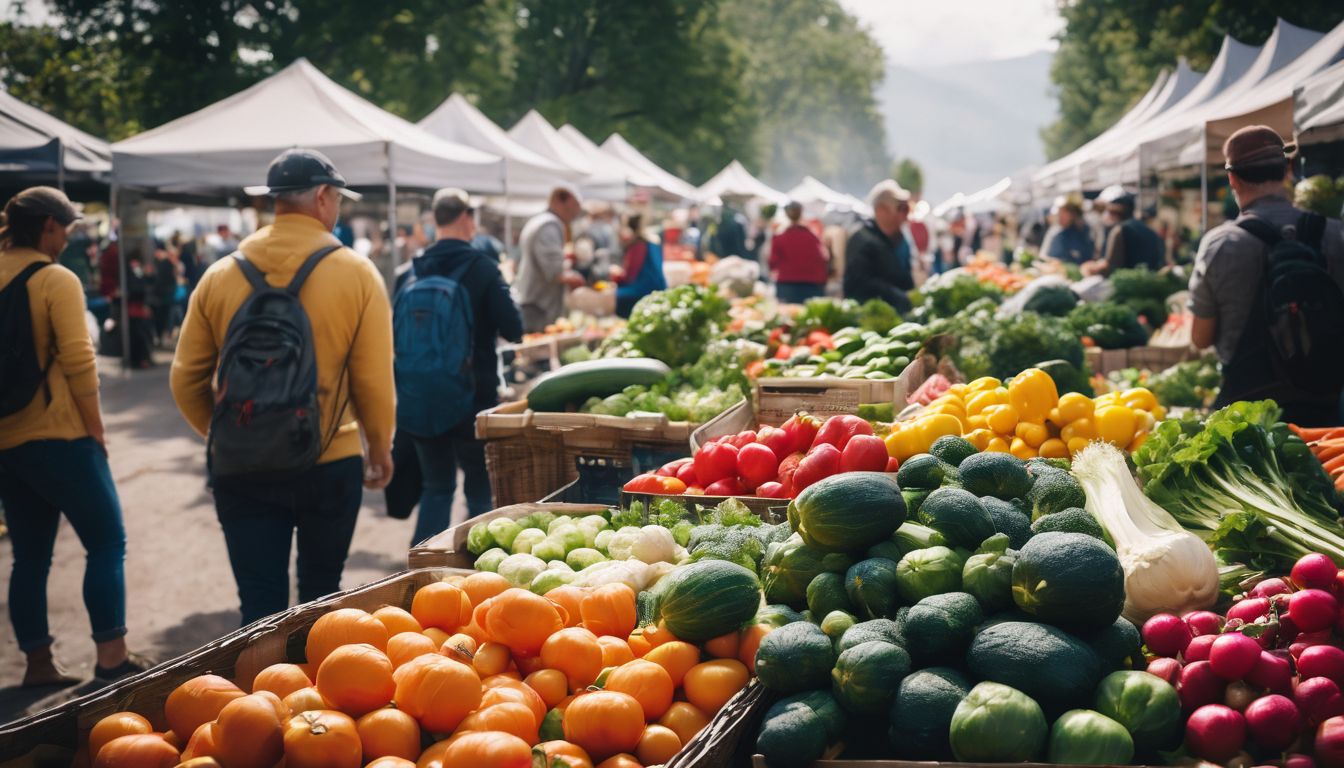Navigating the maze of ethical shopping can often seem like a Herculean task, can’t it? You’re certainly not alone in feeling swamped by the myriad labels and claims out there. However, there’s one beacon of truth that guides us all: the knowledge that our choice to purchase Fair Trade products has a profound ripple effect on countless lives around the globe.
In this forthcoming article, we delve deep into the essence of Fair Trade—unravelling its significance, sharing heart-warming tales of triumph, and offering sage advice on how you can play an integral part in fostering positive change through thoughtful consumption.
So come along; let’s tread this path towards a more equitable world side by side!
Key Takeaways
- Choosing Fairtrade – certified products means supporting fair wages and safe working conditions for farmers and workers in developing countries.
- Through Fairtrade, consumers contribute to sustainable agriculture, environmental conservation efforts, and the fight against child labour.
- By purchasing from reputable brands like Ben & Jerry’s, Nespresso, Endangered Species Chocolate, Starbucks, and Tony’s Chocolonely which support Fairtrade practices, people can enjoy quality goods while promoting ethical sourcing.
- Consumers play a critical role by choosing ethically sourced products that align with social responsibility values.
- Engagement with Fairtrade empowers communities around the world to invest in healthcare, education and infrastructure projects that lead to better living standards.
Understanding Fairtrade
Fairtrade is a global movement that aims to empower farmers and workers in developing countries by ensuring fair wages, safe working conditions, and ethical sourcing. Through Fairtrade, consumers can support sustainable production and equitable trade practices.
Definition of Fairtrade
Fairtrade stands for trade that’s fair and ethical, aiming to give farmers and workers a decent income and safe working conditions. It’s all about making sure the people who produce our food, clothes, and countless other products get paid fairly for their labour.
This movement fights against poverty, empowers producers in developing countries, and promotes sustainable production practices.
We champion products that carry the Fairtrade Mark because it means they meet strict social, economic and environmental criteria. By choosing these goods, we support community development, help ban child labour from supply chains, and insist on transparency throughout the process from field to store shelf.
Our choices as consumers can drive a powerful change towards more equitable trade systems that respect both people’s rights and our planet’s future.
How Fairtrade works
Now that we understand the principles of Fairtrade, let’s delve into how it works. Fairtrade ensures that farmers and workers receive fair wages for their produce and labour. This is achieved by setting a minimum price for products, which provides a safety net during fluctuating market conditions.
Additionally, a Fairtrade premium is paid on top of the selling price, which contributes to community development projects such as schools, healthcare facilities, and infrastructure improvements.
Moreover, Fairtrade certification promotes sustainable farming practices by encouraging crop diversification and environmental conservation efforts.
Furthermore, Fairtrade operates through transparent supply chains that prioritise direct trade relationships between producers and buyers. This eliminates unnecessary middlemen and empowers producers to have more control over their livelihoods.
The Impact of Fairtrade
Fairtrade has had a global impact by empowering farmers and workers in developing countries, ensuring fair wages and safe working conditions. Success stories of Fairtrade products showcase the positive change it brings to communities and the environment.
Global impact
Fair trade has a positive global impact by ensuring that farmers and workers in developing countries are paid fair prices for their products. This wealth transfer helps to alleviate poverty, provide access to essential resources, and create dignified work opportunities.
It also enables these communities to invest in education, healthcare, and sustainable development initiatives. Furthermore, fair trade practices help protect farmers’ and workers’ rights, combat child labor, and address social justice issues within the supply chain.
By supporting fair trade consumer products, we contribute to sustainable sourcing and supply chain transparency while promoting ethical purchasing behaviour. This enables us to play an active role in corporate social responsibility efforts aimed at empowering farmers and workers across the globe.
Success stories
Fair trade success stories demonstrate the positive impact on farmers and workers. These examples inspire confidence in the fair trade movement.
- Endangered Species Chocolate – This company not only produces delicious chocolate but also actively supports fair trade practices. By sourcing cocoa from fair trade cooperatives, they ensure that farmers receive a fair price for their crops and protect the environment, supporting conservation efforts.
- Ben & Jerry’s – Known for their delectable ice cream flavours, Ben & Jerry’s has made a commitment to using fair trade ingredients in their products. This means that the farmers who produce these ingredients are paid fairly, and consumers can enjoy guilt-free treats.
- Nespresso – This coffee giant works directly with coffee farmers through its AAA Sustainable Quality™ Program to ensure high-quality coffee and a sustainable supply chain. Through fair trade principles, farmers benefit from improved living conditions and access to education and healthcare.
- Tony’s Chocolonely – With a mission to end slavery in the chocolate industry, this brand has taken significant steps towards achieving 100% slave-free chocolate production through direct relationships with cocoa farmers and paying them a higher price for their beans.
- Starbucks – Committed to ethically sourcing its coffee beans, Starbucks supports fair trade practices by purchasing directly from smallholder farms at premium prices, empowering these communities economically and socially.
Reports and trends
Building on the inspiring success stories of Fairtrade, we now turn our focus to recent reports and trends that highlight the ongoing efforts and progress in the fair trade movement. These insights are crucial for us, the environmentally conscious community, to understand the broader impact of our consumer choices.
| Year | Report/Trend | Highlights |
|---|---|---|
| 2022 | Global Fair Trade Report | Increased global sales, more Fairtrade-certified producer organisations, and higher Fairtrade Premium payments to farmers and workers. |
| 2021 | Consumer Trends Analysis | Growing consumer demand for ethically-sourced products, with millennials driving the fair trade market. |
| 2020 | Environmental Impact Study | Fairtrade certification linked to better environmental practices and reduced carbon footprint among producers. |
| 2019 | Fairtrade and the SDGs | Alignment of Fairtrade principles with the Sustainable Development Goals, showing contributions to poverty reduction, gender equality, and sustainable agriculture. |
| 2018 | Economic Impact Research | Studies indicate increased financial stability and community investment for Fairtrade farmers compared to non-Fairtrade counterparts. |
These trends and reports guide our collective actions and reinforce our commitment to the fair trade cause. We’re not just buying products; we’re investing in a more equitable and sustainable world.
Brands Impacting Change Through Fairtrade
Several well-known brands have made impactful changes through their commitment to Fairtrade, including Ben & Jerry’s, Nespresso, Endangered Species Chocolate, Starbucks, and Tony’s Chocolonely.
Each of these companies has played a significant role in ensuring fair wages and ethical sourcing practices within their supply chains.
Ben & Jerry’s
Ben & Jerry’s actively supports fair trade initiatives by sourcing many of its ingredients from fair trade producers. The company advocates for the empowerment of farmers and workers, ensuring they receive fair compensation for their products.
This commitment helps protect farmers’ and workers’ rights and prevents child labor, supporting ethical consumerism. Ben & Jerry’s wealth transfer to developing countries promotes sustainable development and environmental conservation.
Nespresso, Endangered Species Chocolate, Starbucks, and Tony’s Chocolonely are other notable brands championing the cause of fair trade through similar practices.
Nespresso
Nespresso supports Fairtrade by sourcing a significant portion of their coffee through fair trade practices. This ensures that the farmers and workers involved in growing and harvesting the coffee beans receive fair compensation for their hard work.
By purchasing Nespresso’s Fairtrade-certified products, we can actively support sustainable farming practices and contribute to the well-being of coffee-producing communities worldwide.
Moreover, Nespresso’s commitment to Fairtrade aligns with our values as environmentally conscious individuals. Choosing their Fairtrade-certified products means supporting conservation efforts while enjoying high-quality coffee sourced from ethical and sustainable supply chains.
Endangered Species Chocolate
Transitioning from the sustainable efforts of Nespresso to yet another brand making a difference through Fairtrade, we focus on Endangered Species Chocolate. This brand has been committed to supporting conservation and environmental causes through its products.
Their chocolate is not only delicious but also supports fair wages for cocoa farmers and protects endangered species. By choosing Endangered Species Chocolate, consumers are actively contributing to the protection of wildlife and rainforests while enjoying a guilt-free treat.
With each purchase, consumers can take pride in knowing that they are directly contributing to preserving ecosystems and promoting fair trade practices. Endangered Species Chocolate exemplifies how consumer choices can make a significant impact on global sustainability efforts, empowering individuals to support ethical and environmentally friendly products.
Starbucks
Starbucks sources its coffee through ethical and sustainable means, with a significant commitment to fair trade practices. By paying fair prices to coffee farmers, the company helps protect workers’ rights and ensures that no child labor is involved in the production of their coffee beans.
This approach aligns with the values of environmentally conscious individuals who support conservation efforts and promote fair treatment of workers in the supply chain. Through choosing Starbucks products, consumers can feel confident in knowing that they are supporting a brand committed to protecting farmers’ and workers’ rights.
In addition to supporting fair trade practices, Starbucks also actively promotes consumer awareness around ethical sourcing and production methods. By making information readily available about their sourcing practices, the company empowers consumers to make informed decisions that align with their values for sustainability and social responsibility.
Tony’s Chocolonely
Tony’s Chocolonely, a well-known brand in the fair trade world, is dedicated to eradicating slavery and child labor from the cocoa industry. Their mission goes beyond just creating delicious chocolate; they actively work towards empowering cocoa farmers and promoting fair wages.
Tony’s Chocolonely takes a proactive stance by directly sourcing their cocoa beans from West African farmers and paying them fair prices for their produce. By supporting Tony’s Chocolonely, consumers contribute to reshaping the global chocolate industry and ensuring ethical practices are at the forefront of production.
The deliberate actions taken by Tony’s Chocolonely resonate with environmentally conscious individuals who seek to support conservation efforts while enjoying their favorite treats.
The Power of Consumers in Supporting Fairtrade
Consumers play a vital role in supporting Fairtrade by empowering farmers and workers, as well as contributing to sustainable development goals. Through their purchasing decisions, consumers can make a positive impact on global communities and the environment.
How fair trade empowers farmers and workers
Fair trade empowers farmers and workers by ensuring they receive fair prices for their products. This allows them to invest in their communities, improve working conditions, and protect the environment.
By directly engaging with fair trade practices, farmers and workers can access resources and opportunities that enable sustainable growth and development.
Furthermore, fair trade provides a platform for farmers and workers to have a say in decision-making processes. It promotes democratic organizations where individuals are involved in shaping their futures.
Benefits for consumers
Consumers benefit from Fairtrade products by knowing that their purchase directly supports sustainable and ethical practices. By choosing Fairtrade, consumers ensure fair wages for farmers and workers, thereby promoting economic stability in developing countries.
Additionally, the assurance of high-quality products encourages consumer satisfaction and loyalty. With a wide array of Fairtrade options available across various industries, consumers have the opportunity to make a positive impact on both people and the planet through their everyday purchases.
Fair trade empowers consumers to align their buying choices with values of social responsibility and environmental conservation. This conscientious decision-making process enables individuals to contribute to a more equitable global economy while also enjoying exceptional goods.
The role of Fairtrade in achieving sustainable development goals
Fairtrade plays a crucial role in helping achieve sustainable development goals. Through Fairtrade, farmers and workers are empowered to improve their livelihoods, protect the environment, and promote social justice.
By supporting Fairtrade products, consumers contribute directly to sustainable development by ensuring fair prices, safe working conditions, and environmental sustainability. This creates a positive cycle of economic stability that benefits communities while also furthering environmental conservation efforts.
Furthermore, Fairtrade has a direct impact on poverty reduction and gender equality by providing opportunities for marginalised groups. Supporting Fairtrade initiatives aligns with the goal of promoting ethical consumption and responsible production as outlined in the Sustainable Development Goals (SDGs).
How to get involved with Fairtrade
To support fair trade and make a positive impact on the environment, here are some ways to get involved:
- Look for Fairtrade – certified products when shopping for everyday items such as coffee, chocolate, bananas, and clothing.
- Educate yourself about the principles of Fairtrade and spread awareness among your friends and family.
- Support businesses and brands that are committed to fair trade practices and ethical sourcing.
- Get involved in local campaigns and events that promote Fairtrade and sustainability within your community.
- Advocate for fair trade policies by writing to your local representatives or participating in petitions supporting fair trade initiatives.
- Consider volunteering with organisations that work towards promoting fair trade and sustainable practices.
- Make a commitment to continue learning about the impact of fair trade on farmers, workers, and the environment.
Conclusion
In conclusion, Fairtrade plays a vital role in supporting sustainable development goals. Consumers have the power to drive positive change by choosing Fairtrade products. By supporting Fairtrade, consumers can empower farmers and workers to improve their livelihoods.
It’s essential for us all to get involved and make a difference through our purchasing decisions. Let’s continue to support brands that are committed to fair trade practices.
FAQs
1. What exactly is Fair Trade in the context of consumer products?
Fair Trade ensures that producers receive fair prices and support for their goods, encouraging sustainable production and ethical treatment of workers.
2. How does Fair Trade benefit consumers?
By choosing Fair Trade products, consumers support responsible company practices and contribute to positive change in global trade systems.
3. Can Fair Trade impact the quality of consumer products?
Yes, as Fair Trade often involves careful attention to production methods, it can lead to higher quality products for consumers.
4. Is it easy to find Fair Trade consumer products?
With growing awareness, finding Fair Trade labeled goods in stores has become easier for shoppers looking to make ethically informed choices.





